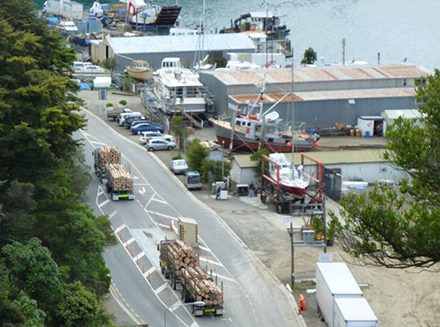
An acute shortage of heavy goods drivers in Northland, New Zealand has prompted an industry leader to warn the situation will not improve unless the right people are identified for the profession and groomed through the education system. Sources: New Zealand Herald, Northern Advocate
As calls are made by Unions Northland for wages for logging truck and other heavy goods drivers to be increased, the Road Transport Forum said downward pressure on freight rates, high operating costs, and a shortage of drivers were affecting trucking businesses hugely.
Forum chief executive Ken Shirley said while an H5 licence was the legal threshold for heavy truck and trailer drivers in the country, it did not make them competent and experienced.
“To be a top driver it takes about five years of work experience and because there’s a chronic shortage of H5 drivers, many companies grab whatever they can as long as people have got H5 licence,” he said.
Mr Shirley said many Kiwi companies were forced to hire drivers from overseas after going through the licensing system. He said there would be logging truck drivers in Northland with little experience. Northland has had a number of logging truck crashes this year, with seven in the past seven weeks and at least 10 since the end of 2015.
Mr Shirley said transport operators had to front up to the situation. He said because of a lack of experience, a Rollover Prevention Safer Journeys’ seminars the Forum organised with other stakeholders in Whangarei and throughout the country would help educate drivers and freight loaders on the factors that could cause a truck to roll. They include the influence of speed, centre of gravity, weight transfer and cornering forces.
Two seminars in Whangarei last week saw 180 truck drivers, transport operators and forest owners attend.
Mr Shirley did not know the reason for a shortage of truck drivers, but said the problem was being felt throughout the world including the likes of the US, UK, and most OECD countries.
The forum, he said, was in talks with the New Zealand Transport Agency to make the seminar mandatory as part of obtaining heavy truck and trailer licence.
Whangarei businessman Stan Semenoff’s trucking firm has been short between 21 and 28 drivers a day for the past nine months, forcing him to bring in 10 drivers from the Philippines recently. He is arranging more drivers from that country.
Mr Semenoff said the industry was in turmoil because the welfare and education systems over the past three decades have taken away that Kiwi ingenuity.
“We’ve got people who are unemployable as opposed to unemployed because of a failure to bring the right cadetship out of our education system,” said the owner of Stan Semenoff Transport.
The proof, he said, was in the pudding as New Zealand employers were getting skilled workers from abroad to build Auckland and Christchurch, while good kids coming out of schools struggled to find jobs.
Mr Semenoff said he was forced to hire contractors to cover his bulk haulage, log, and sand supplies businesses.
“Because of strict drug and alcohol requirements, and they should be strict, we’re losing them, at times two a week to random drug testing.”
He said the Filipino drivers were given appropriate training, including in Occupational Health and Safety, before they got behind the wheel.
Agencies such as the Ministry of Business, Innovation and Employment and polytechs, he said, had been helpful in referring suitably qualified people to work as truck drivers.
On calls for better pay for truck drivers, the former Whangarei mayor said that was not possible at this stage because of low freight charges.
Unions Northland said many truck drivers earn $16.60 an hour and says the rate should be in the mid-$20s.





